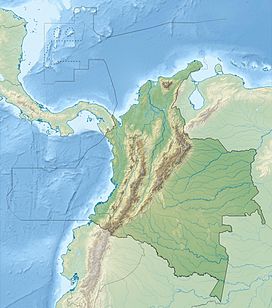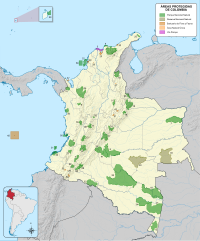Serranía de San Lucas
| Serranía del San Lucas | |
|---|---|
 | |
| Highest point | |
| Elevation | 2,700 m (8,900 ft) |
| Coordinates | 7°40′00″N 74°12′00″W / 7.66667°N 74.20000°W |
| Dimensions | |
| Area | 16,000 km2 (6,200 sq mi) |
| Geography | |
| Country | |
| Department | Antioquia and Bolivar |
The Serranía de San Lucas is a forested massif in the Bolívar Department of northern Colombia that reaches heights of 2,600 m above sea level. It is part of the Magdalena–Urabá moist forests ecoregion,[1] with a rainforest ecology that includes large monkey and bird populations.
It is a 'forest reserve' that has been recommended for protection,[2] but has been opened to mining by the Colombian government,[3] as the mountains have large deposits of gold, emeralds, nickel and mercury.[4] AngloGold Ashanti has been exploring in the area since 2004, causing tensions with local small-scale miners.[5]
The ELN guerrilla group enforced forest protection in the area in the early 2000s, apparently to protect local hydrology.[6] The area is still subject to fighting between drug cartels, FARC, ELN, the Black Eagles and the Colombian army.[5]
References
[edit]- ^ "Magdalena-Urabá moist forests". Terrestrial Ecoregions. World Wildlife Fund. Retrieved 2009-11-12.
- ^ "The Serrania de San Lucas Other Area". World Database on Protected Areas. Retrieved 2009-11-12.
- ^ "Ecological holocaust: Serranía de San Lucas at risk". ProAves. 11 August 2009. Retrieved 2009-11-12.
- ^ Rohter, Larry (8 July 2000). "Earmarked for Colombian Rebels, a Region Asks to Be Left Alone". New York Times. Retrieved 2009-11-12.
- ^ a b Maldonado, Juan Camilo (8 January 2008). "En la Serranía no brilla el oro". Elespectador (in Spanish). Retrieved 2009-11-12.
- ^ McNeely, Jeffrey A. (2003). "Conserving forest biodiversity in times of violent conflict". Oryx. 37 (2): 142–152. doi:10.1017/s0030605303000334.



